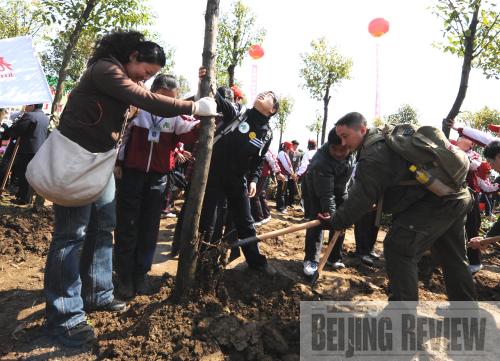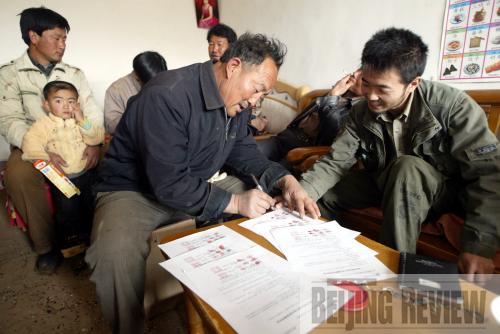|
 |
|
GREEN MOTHER: Volunteers plant trees on March 24 in Nanjing, Jiangsu Province, during the 10th anniversary of the Mother River Protection Operation (YANG LEI) |
This year's World Earth Day, which fell on April 22, coincided with the third annual SEE-TNC Ecological Awards. The award, first established in 2005 by Chinese environmental non-government organization (NGO) Alxa Society of Entrepreneurs and Ecology (SEE) and leading conservation group The Nature Conservancy (TNC), aimed to promote Chinese NGOs to participate in environmental protection and to help improve the environment. The theme of the third SEE-TNC Ecological Award was "win-win cooperation."
 |
|
TEAMING UP: Farmers in Alxa, Inner Mongolia, sign a contract with environmental NGO Alxa SEE to protect their environment (CFP) | First prize went to a project that investigated and conserved underground rivers around Dianchi Lake in Kunming, Yunnan Province, that was led by Mei Nianshu, Director of the NGO Green Kunming Environmental Protection Association. Green Kunming was established on April 22, 2006, and uses environmental science to encourage people to participate in environmental protection.
"A new cooperative era for environmental NGOs has come," said Wang Shi, President of SEE.
Difficult career
China had no environmental NGOs until 1994, when the Academy for Green Culture was formally registered as the first. The group is now called Friends of Nature (FON).
In 1996, two new environmental NGOs, Global Village of Beijing and Green Home, were set up. Together with FON, the three organizations are considered to be China's pioneer environmental advocates.
China's environmental NGOs have experienced many difficulties in the development process, said Liang Congjie, President of FON.
One obstacle comes from the strict requirements regarding the founding of NGOs, said Hong Dayong, a sociology professor at Renmin University of China.
Regulations both demand that NGOs register with civil affairs authorities and have their work supervised by a professional leading unit, which creates a dual oversight structure, he said.
Another difficulty faced by the environmental NGOs is limited funding. Liao Xiaoyi, President of Global Village of Beijing, said it is very difficult for China's environmental NGOs to raise funds in the country because of problems with the tax system.
"Global Village of Beijing has never had a source of regularly recurring funds. Its revenue depends on fees for producing TV programs, which cannot be considered a guaranteed income stream," he said.
The lack of money is a serious constraint to their efforts. Green Home had a project on the Kerqin Grasslands near Inner Mongolia Autonomous Region's Chifeng City, he said. They planted grass to slow erosion and were beginning to see clear progress. But the project had to be stopped after three years of effort because they ran out of money.
Another factor holding back the NGOs is their lack of influence, Liang said.
"Compared with other countries and regions, China's NGOs are still very young and our voices are usually weaker," said Liang. "When environmentally damaging incidents occur, we can do almost nothing but make public appeals."
On June 5, 2004, SEE was founded. It was sponsored and initiated by some 100 well-known entrepreneurs. In 2005, the SEE-TNC Ecological Award was established. With the joint efforts of the SEE and other environmental NGOs, the development of China's environmental NGOs entered a new stage, said Yang Peng, Secretary General of SEE.
Maturing advocacy
"After 15 years of development, China's environmental NGOs have gradually become mature," said Yang Dongping, a professor with the Beijing Institute of Technology's School of Arts.
Today, China's NGOs can clearly understand where they fit into society, Yang said.
"FON is a small organization and we cannot solve all environmental problems, so we put our emphasis on urban environmental problems," said Li Bo, Director of FON.
|
